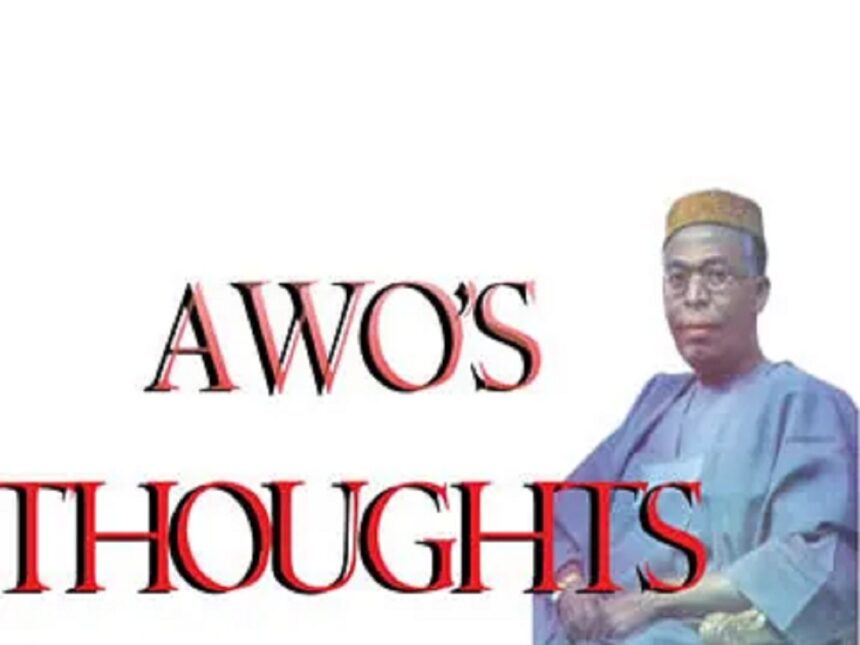CONTINUED FROM LAST WEEK
Speech delivered by Chief Obafemi Awolowo as Federal Commissioner for Finance to the Conference of Finance Commissioners of the Federation in Kano on 23rd February, 1970.
For the avoidance of misunderstanding, I would like to stress that whilst the Northern and riverine areas of the country, for economic and social reasons which we do not need to go into here, lag very much behind in transportation development, and should therefore be given special attention henceforth, the crucial point must not be overlooked that the areas of convergence for most of our transportation activities in the country are those adjacent to the ports at Port Harcourt, Calabar, Sapele, Warri, Escravos, Lagos, and Apapa. It follows from this fact that the development of those roads, within the areas of the Mid-Western, Eastern, Western, and Lagos regions, which give access to the ports, is of common concern to all the States in the Federation. For, any transportation deficiency in these areas is bound to constitute time-wasting, labour-wasting, and capital-wasting bottlenecks of the worst order.
THE SEVENTH IS PUTTING THE FEDERAL GOVERNMENT IN SUFFICIENT FUNDS TO ENABLE IT NOT ONLY TO PERFORM ITS ALLOTTED FUNCTIONS IN THE NATIONAL INTEREST, BUT ALSO TO COME READILY TO THE AID OF ANY STATE IN NEED. There is need for all the Governments of the Federation to agree to pursue the six preceding objectives, and to make detailed and scientific plan for their implementation. Granting that this is done, it is believed that, unlike now, each State would be in a position to perform its functions effectively and justify its existence to the people under its jurisdiction without undue anxiety.
But if perchance, any State fell on an evil day, it should be the duty of the Federal Government, acting as the accredited agent of all the other States, to come to the aid of such a needy State, without delay. To this end, the Federal Government should be provided with enough funds. It will not be easy in the beginning to estimate how much this will be. But as time goes on, experience will guide us. It was the good fortune of those of us here gathered to keep the coffers and manage the finances of our great country during the darkest and most trying period of its history. It may still be calculated – in thirty months of civil war, without in formulating the principles which will, in future, guide allocation of revenue among the Governments of the Federation. In any case, it is the duty of every citizen of this country, who has any worthwhile opinion to offer on this vital but knotty problem, to do so with the sole desire of creating a new Nigeria which will be worthy of the sacrifices which its loyal citizens had made of late, and which will incline all erring citizens to repent their past misdoings, as well as refrain from falling into the same error in the future. It is for all these reasons that I have deliberately chosen this opportunity, which may well be the last we have before the next exercise in revenue allocation begins, to stimulate your thoughts on this very important issue.
The objectives which I have outlined to you are very lofty. For Nigeria, they have to be. An underdeveloped nation which could afford to spend well over £300m – the figures are still being calculated – in thirty months of civil war, without borrowing a penny from abroad, without buying a single item of military equipment on credit from anyone, without receiving a gift of any kind from abroad, and without being economically weakened and prostrate in the process, can do practically anything if it makes up its mind to do it, and plan well for it accordingly.
Now, I take it that it is common knowledge that, in the long run, the ravages of ignorance, superstition, disease, squalor, and poverty which daily and everywhere in Nigeria confront us, are more tormenting and devastating than the rebellion which ended ignominiously about a month ago. It is our inescapable duty to contain and terminate these ravages, with all the resources at our disposal, and with all the skill and speed which we can jointly muster.
As long, however, as each State is left to fend for itself unaided, or half-heartedly aided, in such crucial matters as employment, education, health services, modernisation of agriculture, industrialisation, road and waterway development, and tiding over periods of need; and as long as attempts are made, at the same time, to apportion revenue strictly on the basis of population, or in vacuo without having any specified national objectives in view, so long would the evils of unemployment, etc., remain with us, engendering bitter bickering, and acrimonious wrangling on revenue allocation, and other national issues.
But I make bold to say that, if we succeed in getting ourselves to agree to tie allocation of revenue to the seven objectives which we have previously noted, certain beneficial results will be bound to follow: each State, regardless of individual wealth or the lack of it, Would be able to fulfil the sole purpose for which it was created, which is to cater to the best interests of the people under its jurisdiction; equal economic and social progress would be guaranteed to all our peoples irrespective of their State of habitation; there would be social harmony such as was never before witnessed in our land; and political stability would become the permanent lot of our beloved country.
In closing, I welcome you all to this Conference; and pray that our deliberations here may be fruitful, and beneficial to our country and people.
HOW TO ACHIEVE ECONOMIC FREEDOM IN DEVELOPING COUNTRIES
Full text of lecture delivered by Chief Obafemi Awolowo at the First Lecture in the UNIVERSITY OF LAGOS ANNUAL LECTURE SERIES on Friday, 15th March, 1968
I thank the Vice-Chancellor and his colleagues very much for the honour which they have done me by inviting me to deliver the first of the UNIVERSITY OF LAGOS ANNUAL LECTURES.
In his letter of invitation to me, the Vice-Chancellor had proposed five subjects, all of which are equally attractive, and difficult to treat, I have, therefore, chosen the one which I consider would have wider appeal and interest, and comparatively less intractable to treat, than the others. It is THE PATH TO ECONOMIC FREEDOM IN DEVELOPING COUNTRIES.
It is necessary, at the outset, to describe and define two phrases as carefully and precisely as possible. They are (1) Economic Freedom, and (2) Developing Countries.
In economic usage, economic freedom is a phrase of art. It is an inseparable characteristic of the capitalist system, It means – for the individual, interest group, or a country – freedom of industry and enterprise. In this sense, economic freedom epitomises what I choose to call the FOUR POSTULATES of capitalism, and its enjoyment is subject to the two fundamental economic forces of (1) supply and demand or the price mechanism, and (2) marginal utility or productivity.
The first of the four postulates is the postulate of PRIVATE PROPERTY. The right of the individual to own and control as much economic goods as he can successfully lay claim to, and can appropriate to himself by all legitimate means, is recognised and protected by law.
The second is the postulate of CHOICE. It is assumed that each individual has complete freedom of choice; ‘he may use his energy and property as he thinks fit’, subject only to such restraint as may be imposed upon him by law.
The third is the postulate of EQUALITY. Here it is posited that everyone ‘may work, live and freely contract on a basis of equality with others and with the same opportunity as his fellows.’ The fourth is the postulate of EGOISTIC ALTRUISM. Under this postulate it is assumed that by pursuing his economic self-interest, every individual unconsciously promotes at the same time the economic interests of others. The intention of the individual is not generally to promote public interest but his own security and gain. In the process, however, he is led by an ‘invisible hand’ to promote an end which was no part of his original intention. By deliberately promoting his own selfish interest, he promotes that of society more effectively than when he tries more consciously to promote it.
In other words, a country can be said to be free, in the capitalist economic sense, when, under the auspices of supply and demand and marginal utility, it exercises the right to property, to employ its resources as it thinks fit, to manage its affairs on the basis of equity and with the same opportunity as other countries, and to pursue its own self-interest to the exclusion of others.
But, in the context of this lecture, I am using the phrase in a politico-economic sense as applied not to an individual or group of individuals but to a country. In this sense, ECONOMIC FREEDOM EX[STS WHEN A POLITICAL SOVEREIGN COUNTRY, INDEPENDENTLY OF OUTSIDE CONTROL OR DIRECT[ON, ORGANISES THE EXPLOITATION AND DEPLOYMENT OF ITS TOTAL RESOURCES FOR THE BENEFIT OF ITS ENTIRE PEOPLE, UNDER A SYSTEM IN WHICH THE FORCES OF SUPPLY AND DEMAND AND OF MARGINAL UTILITY ARE CONTROLLED AND CANALISED FOR THE COMMON GOOD.
It is important to bear this distinction in mind for a number of reasons. Firstly, the postulates of capitalism are false and a snare; and the forces of supply and demand and of marginal utility, when they are allowed to operate without conscious control, are injurious to all human freedom. Secondly, it is possible for a country to be economically free in the capitalist sense whilst the majority of its citizens are enslaved, as was the case in European countries under feudalism and laissez-faire capitalism. The converse of this is also true, namely: it is possible for the citizens to enjoy economic freedom in the capitalist acceptation of the term, whilst the country as a whole is economically enslaved, as is the case with developing countries including Nigeria. Thirdly, economic freedom, in the politico-economic sense, is the opposite of economic subjection, in the same sense. Whilst, in this sense, economic servitude for a country is a concomitant of political subjection, economic freedom does not necessarily go hand in hand with political independence.
It is generally agreed that the phrase DEVELOPING COUNTRY is a euphemism for UNDERDEVELOPED COUNTRY. The two phrases are synonymous. But for the sake of clarity, it is better to use UNDERDEVELOPED COUNTRY in place of DEVELOPING COUNTRY. To confine the latter phrase to economically backward countries is misleading and deceptive. No country in the world is stagnant or static. Every country is developing all the time, whether it is already highly developed, or terribly underdeveloped. Indeed, the so-called advanced or developed countries are, relatively, developing faster than the underdeveloped.
CONTINUES NEXT WEEK
READ ALSO: Revenue allocation must be on the basis of even progress and need
WATCH TOP VIDEOS FROM NIGERIAN TRIBUNE TV
- Let’s Talk About SELF-AWARENESS
- Is Your Confidence Mistaken for Pride? Let’s talk about it
- Is Etiquette About Perfection…Or Just Not Being Rude?
- Top Psychologist Reveal 3 Signs You’re Struggling With Imposter Syndrome
- Do You Pick Up Work-Related Calls at Midnight or Never? Let’s Talk About Boundaries







